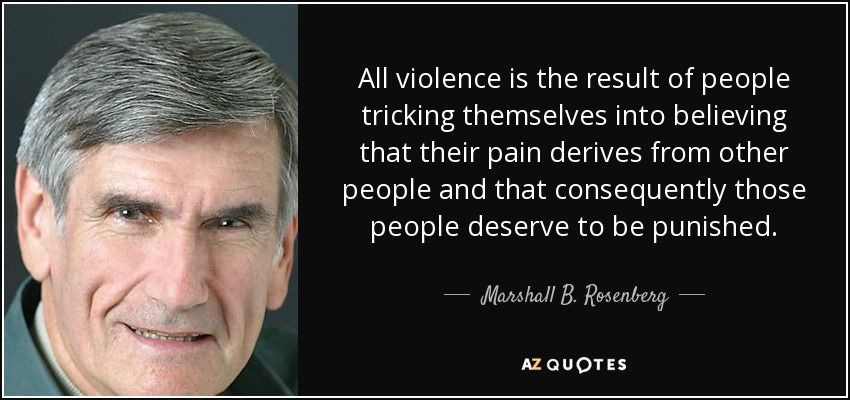In 2019, as I was going through a program to become a Certified Parent Coach with The Jai Institute for Parenting, I was assigned to read the book Nonviolent Communication.
This book blew my mind and continues to surprise me with it’s ability to create a healthy communication style for anyone struggling with effectively communicating their feelings, needs and wants in relationships.
This book is great for parents too!!!

This week I picked the book up again to review some material for The Cycle Breaker Blueprint Program I am working on (so excited about this!!!) and I realized that:
Rosenberg’s definition of violent communication is the exact formula narcissists use to communicate which makes sense as to why their words, actions and behavior can feel so violent even if they are delivering messages with a smile.
Photo by Max Bender on Unsplash
I want to hear from you! Take the poll below to let me know what you’d like me to cover in future posts!
What is Violent Communication?
Marshall B. Rosenberg, Ph.D. is a world renowned author, speaker and founder of The Center for Nonviolent Communication which is an international peacemaking organization. Rosenberg states:
"Any communication that causes pain or harm to anyone (including ourselves) is “violent,” while any communication that stems from true compassion is “nonviolent.”
Narcissists Train Us to Use Violent Communication with Ourselves
Violent Communication is judgmental, critical, extreme, blaming, harsh - many of the the ways we talk to ourselves when we are raised by a narcissistic parent.
When we have narcissistic parents, our thoughts and perceptions are trained by people who have faulty thinking and cannot clearly see us for who we are, so it is CRUCIAL to address this issue so we can learn to see ourselves differently and with clarity.
Unfortunately we learn to use this violence against ourselves long after they have used it with us. We must shift our thoughts to gentleness, acceptance and encouragement in order to heal these deep wounds from our parents.
More to come on this idea in next week’s post!
Below I will cover the four types of violent communication so you can be aware of how it might be manifesting in your life and relationships.
Four Types of Violent Communication
1. Moralistic Judgements:
Includes blame, insults, put-downs, labels, criticism, comparisons and diagnoses or seeing someone as "wrong" because they have a different viewpoint. Narcissists view others as bad just because they disagree which blocks effective communication, problem solving and having healthy connections with others.

2. Comparisons:
This type of thinking blocks compassion both for oneself and for others. It emphasizes putting people, ideas or things into either the “all good” bucket or the “all bad” bucket rather than working towards solutions with others.
"Comparisons are a form of judgement." - Marshall Rosenberg

3. Denial of Responsibility:
Examples include a person blaming their feelings, thoughts, and actions on others, vague and impersonal forces, authorities, policies, rules and regulations. Narcissists are masters at refusing to be responsible for their actions, words and overall behavior.
"Communication is life-alienating when it clouds our awareness that we are each responsible for our own thoughts, feelings and actions." - Nonviolent Communication
4. Demands
As opposed to requests, demands explicitly or implicitly threatens listeners with blame or punishment if they fail to comply. Narcissists are very demanding of others and create situations where we have to give up our desires, feelings or truth in order to please them. They are not flexible and have a hard time compromising, because it’s either their way or the highway.
"We can never make people do anything. Thinking based on 'who deserves what' bocks compassionate communication." - Nonviolent Communication
Photo by Adi Goldstein on Unsplash
You can visit www.nonviolentcommunication.com to learn more about Nonviolent Communication.
Cycle Breaker Tips:
1. Notice when your narc is communicating violently:
Listen carefully when the narcissist in your life is talking and see if you can pinpoint these four types of violent communication. Become aware of how much they communicate this way and how much it might be impacting you.
2. Set appropriate boundaries:
Set boundaries by saying: “I’m happy to listen when you can speak to me calmly and respectfully like I’m speaking to you now.” Remove yourself when they are disrespectful, critical and blaming your for their feelings or behavior.
3. Begin to listen to your internal story:
Journal and reflect on your internal dialogue, it is likely polluted with all sorts of violent communication. Begin to shift your internal story to be more gentle and kind to yourself.
Your Biggest Fan,
Want to set up a FREE consultation to get support and validation as you heal from narcissistic abuse? Click HERE to set that up!












What is your biggest pet peeve from the four types of violent communication above?